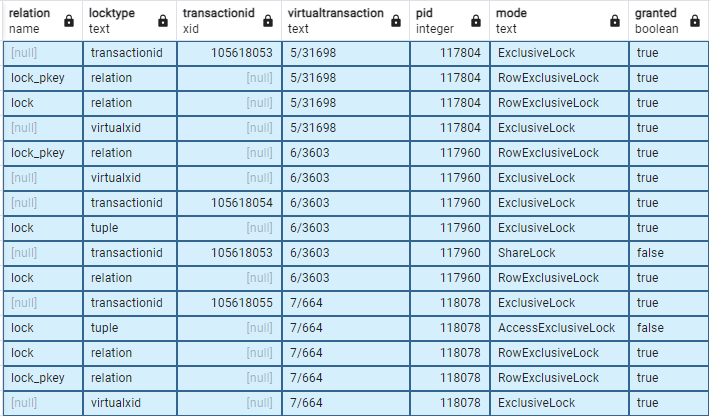Обсуждение: Question about tuple´s lock
Hi!
I need some help to understand why a transaction wiht a row delete aquire a AccessExclusiveLock and a row update a ExclusiveLock.
To ilustrate, a made this scenario:
create table tblock
(
id int primary key,
value text
);
insert into tblock values (1, 'somevalue');
First start Transaction 1:
begin;
update tblock set value = 'othervalue' where id = 1;
-- keep this transaction opened
After, start Transaction 2:
begin;
update tblock set value = 'onemorevalue' where id = 1;
-- at this point, this transaction assumes a ExclusiveLock in the tuple;
-- keep this transaction opend
Then, start Transaction 3:
begin;
update tblock set value = 'lastofthevalues' where id = 1;
-- here i can see this transaction trying to aquire a AccessExclusiveLock in this tuple
So, my question is: why a delete row requires a AccessExclusiveLock in the tuple insteead of ExclusiveLock?
Bellow, a image of a query over pg_locks:

PostgreSQL version: 13
OS: Centos 7
Thanks in advance.
 | Carlos Alves Especialista  Sia Trecho 08, lotes 245 / 255 / 265 || +55 (61) 3039-9700 71205-080 || Guará || Brasília, DF 0800-6020097 www.tecnisys.com.br |
Вложения
Em 24/10/2023 13:27, Carlos Alves escreveu:
Hi!
I need some help to understand why a transaction wiht a row delete aquire a AccessExclusiveLock and a row update a ExclusiveLock.
To ilustrate, a made this scenario:
create table tblock
(
id int primary key,
value text
);
insert into tblock values (1, 'somevalue');
First start Transaction 1:
begin;
update tblock set value = 'othervalue' where id = 1;
-- keep this transaction opened
After, start Transaction 2:
begin;
update tblock set value = 'onemorevalue' where id = 1;
-- at this point, this transaction assumes a ExclusiveLock in the tuple;
-- keep this transaction opend
Then, start Transaction 3:
begin;
update tblock set value = 'lastofthevalues' where id = 1;
-- here i can see this transaction trying to aquire a AccessExclusiveLock in this tuple
So, my question is: why a delete row requires a AccessExclusiveLock in the tuple insteead of ExclusiveLock?
Bellow, a image of a query over pg_locks:
PostgreSQL version: 13
OS: Centos 7
Thanks in advance.
I typed the last command wrong. Should be:Transaction 3:
begin;
delete from tblock where id = 1;
Sorry!
Вложения
Carlos Alves <carlos.alves@tecnisys.com.br> writes:
> I need some help to understand why a transaction wiht a row delete
> aquire a AccessExclusiveLock and a row update a ExclusiveLock.
UPDATE can use the weaker lock type if it's not modifying any
column that is part of a unique index. This is to allow concurrency
with foreign-key checks that might wish to grab a read-only (shared)
lock on such a tuple.
A DELETE, or an UPDATE that is modifying key columns, has to
conflict with foreign-key checks.
regards, tom lane
Em 24/10/2023 17:31, Tom Lane escreveu:
Carlos Alves <carlos.alves@tecnisys.com.br> writes:I need some help to understand why a transaction wiht a row delete
aquire a AccessExclusiveLock and a row update a ExclusiveLock.
UPDATE can use the weaker lock type if it's not modifying any
column that is part of a unique index. This is to allow concurrency
with foreign-key checks that might wish to grab a read-only (shared)
lock on such a tuple.
A DELETE, or an UPDATE that is modifying key columns, has to
conflict with foreign-key checks.
regards, tom lane
Tom,
thank you very much for your straight to the point answer!
regards
Carlos Alves
